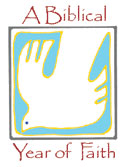Official Website of the
Catholic Diocese of Little Rock
God's word invites us to encounter God
Published: October 13, 2012
This is the first column in a 14-part series
By Cackie Upchurch
Director of Little Rock Scripture Study
Fifty years ago, on Oct. 11, 1962, Pope John XXIII opened the Second Vatican Council, saying in his remarks, "the whole of history and of life hinges on the person of Jesus Christ." As we use this anniversary to mark the beginning of a Year of Faith, called for by Pope Benedict XVI, we do so as part of a larger effort known as the new evangelization. This effort, our pope tells us, is not a formula but first and foremost a "profound experience of God."
 This, then, is a season for renewed conversion to the Lord. This is a time our Church is giving us to focus our efforts to reach out not just to those who do not know the Lord, but to those of us who have known him and grown weary or cold in responding in faith. We are being given an opportunity to warm our hearts in word and sacrament (Luke 24:26-32).
This, then, is a season for renewed conversion to the Lord. This is a time our Church is giving us to focus our efforts to reach out not just to those who do not know the Lord, but to those of us who have known him and grown weary or cold in responding in faith. We are being given an opportunity to warm our hearts in word and sacrament (Luke 24:26-32).
The bishops of the United States, in their document, "Disciples Called to Witness," speak of a lifelong process of conversion and the need to cultivate "a culture of witness" in which that can happen. A crucial pathway to experiencing God in a profound way is the Bible, and a host of witnesses can be found in its pages as well.
Throughout this Year of Faith, this monthly column will consider how the Bible can and must serve as a foundation for our own growing faith. Taking time to focus on events such as Moses at the burning bush and the Passover meal and Last Supper can guide us in how we commemorate our own encounters with God.
Giving attention to Abraham, Sarah, Mary and the woman at the well will help us consider the variety of faithful ways that we might respond to God's call. Considering how God is pictured walking in the Garden of Eden or speaking through the prophets or listening to our honest prayers will remind us of the personal ways we experience God in the course of our lifetimes. And in countless ways, we will be reminded of the value of the community of faith in nurturing one another along the way.
There are many ways to celebrate this year, and many ways to educate ourselves throughout this time. Perhaps, however, there is no better way to cultivate a culture of witness than to revisit the sacred texts that serve as our foundation.
In his letter to the church in Rome, St. Paul the Evangelist reminds his listeners that all who call upon the Lord will be saved. He goes on to remind them of the duty of believers in this work of salvation: "But how can they call on him in whom they have not believed? And how can they believe in him of whom they have not heard? And how can they hear without someone to preach? And how can people preach unless they are sent? … Faith comes from what is heard, and what is heard comes through the word of Christ" (Romans 10:14-15, 17).
Our challenge in this year is to set aside time to read and pray with the words of Scripture. Join a Bible study group, spend time in daily personal Bible reading, use writings such as this to stir your imagination and deepen your commitment to grow in your relationship with God.
The late Bishop Charles Buswell, formerly of Pueblo, Colo., was present at Vatican II, and joined with a group of U.S. bishops in a study group preparing the document on Scripture. He said of the experience, "I came to an understanding of the beauty and of the power of God's word that I had never had before. I began to see in the holy Scripture the actual presence of the Lord. I began to realize that while pondering this word, the power of God and of his love would sink deep into my mind and heart to transform me into the kind of person my Christian vocation called me to be."
In this Year of Faith, we too can rediscover the beauty and power of God's transformative word. Like Bishop Buswell, we can become witnesses once again to the God we encounter there.
Study Questions
- What have you heard about the Year of Faith or the new evangelization?
- In what ways has the Bible been an avenue of growth in faith for you? What could you do to allow the Bible to become a richer source of a "profound experience of God?"
- When you consider how people you know give witness to their life in Christ, how does their witness encourage you?
- How might you carve out time for praying and reading the Bible during this Year of Faith?
This article was originally published in Arkansas Catholic Oct. 13, 2012. Copyright Diocese of Little Rock. All rights reserved. This article may be copied or redistributed with acknowledgement and permission of the publisher.









